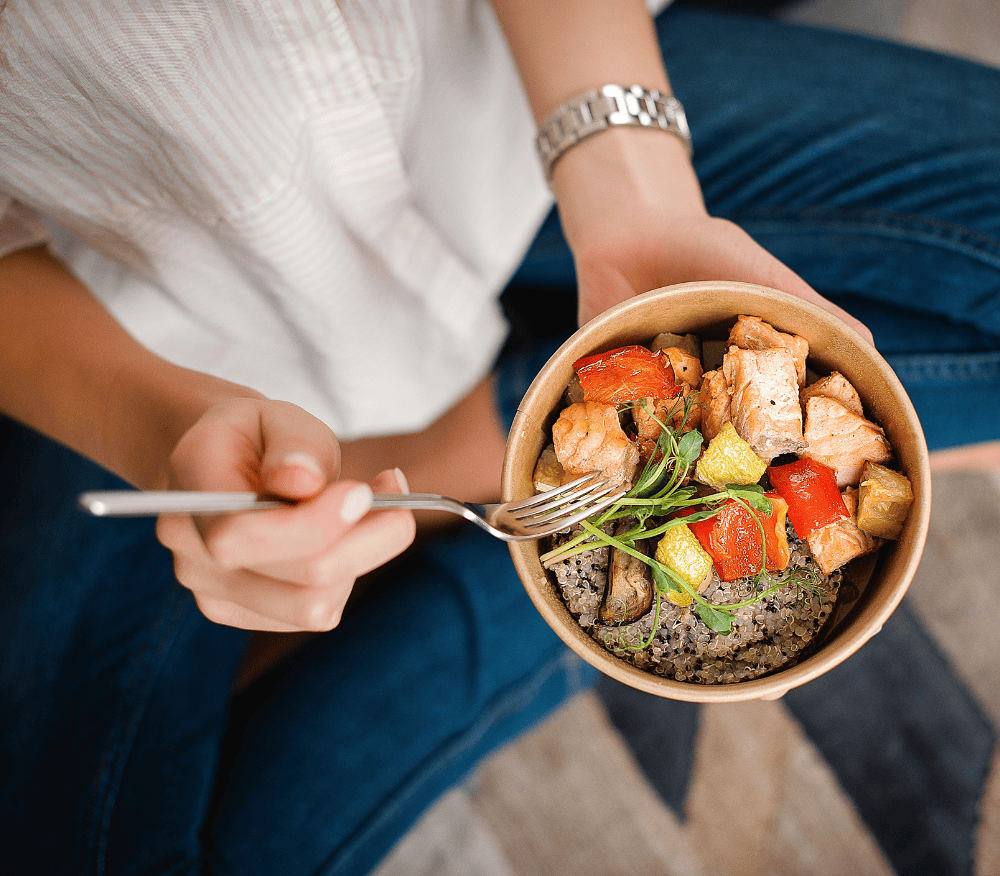Written by Sammie Gill
Eating is one of the most common causes of bloating. This is because your gut microbes produce gas when they break down non-digestible nutrients, such as fibre.
The amount of gas you produce and how bloated you feel will depend on the types of microbes in your gut as well as your gut transit time.
Gut Basics
Your gut is hollow tube around 9 metres long, meaning that the food you eat has quite the journey to go on from one end to the other. In fact, it takes just over one full day (around 28 hours) for your food to travel all the way through. But, it varies hugely from person to person.
If we break it down further, it can take anywhere from 2-5 hours for food to leave your stomach, 2-6 hours to travel through your small intestine and 10-59 hours to travel through your large intestine.
Your food is pushed through your gut by peristalsis – a series of coordinated, involuntary wave-like movements caused by the muscular walls of the gut contracting and relaxing (similar to how you squeeze toothpaste out of a tube).
Given its length, it’s probably unsurprising to know that your gut always contains digested food from meals you’ve previously eaten. When you eat again, ‘old’ food is pushed through your intestines to make way for ‘new’ food.
Which foods cause bloating?
The foods that tend to cause bloating are all the foods that your gut loves – plant-based foods such as wholegrains, nuts, seeds, legumes, fruit, and vegetables. Why? Because these foods contain fibre.
Fibre is an umbrella term – there are many different types of fibres. Different fibres behave in different ways when they reach the gut.
The types of fibres with a reputation for causing bloating are the fermentable fibres. These include resistant starches and prebiotics such as inulin, galactooligosaccharides (GOS), frucooligosaccharides (FOS).
Some foods contain higher amounts of fermentable fibres than others. For example:
- Onion
- Garlic
- Jerusalem artichoke
- Asparagus
- Unripe (green) banana
- Reheated pasta, rice and potatoes
- Oats
- Legumes (e.g. butter beans, kidney beans, cannellini beans, baked beans, lentils, chickpeas)
Why do they make me feel bloated?
Fermentable fibres are ‘food’ for your gut microbes. For this reason, they are important for gut health and should be included in your daily diet.
They are more readily fermented (broken down) than other types of fibre. In return, your microbes release beneficial compounds (such as short chain fatty acids) and gas into your gut which can make you feel bloated.
Remember though, a bit of bloating is completely normal – it shows your gut microbes are well fed. Also, how much gas you produce will depend on the types of microbes living in your gut.
How can I minimise bloating but keep up my fibre intake?
Spread them out
Eat your plant-based foods throughout the day as part of meals and snacks so you’re drip feeding your gut with fibre rather than eating a large volume of fibrous plants in one go.
Mix up your fibres
Studies have shown combining fermentable fibres with less fermentable fibres can slow gas production. Aim for a range of plant-based foods to maximise fibre types.
Build up slowly
Increase your fibre intake gradually over several weeks to give your gut microbes time to adjust.
Address other bloating-related factors
These include constipation, stress, consumption of fizzy drinks, sitting for long periods of time, eating quickly and swallowing air, and wearing tight clothes.
Trial other remedies
Some people find peppermint capsules or probiotics can help reduce bloating.
NB: If the bloating you experience is excessive, painful, and/or alongside other gut-related symptoms (such as pain or changes in poop habits), make an appointment to see your GP.
Sources
Advancing human gut microbiota research by considering gut transit time. (2022). Link.
Dietary fibre in gastrointestinal health and disease. (2021). Link.
Psyllium reduces inulin-induced colonic gas production in IBS: MRI and in vitro fermentation studies. (2021). Link.



